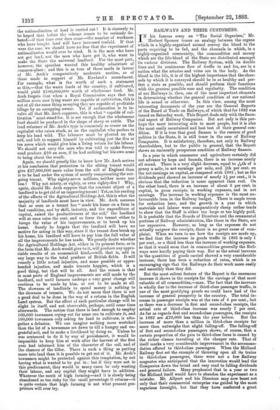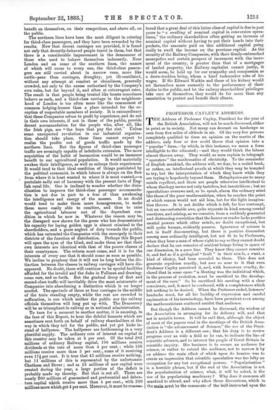RAILWAYS AND THEIR CUSTOMERS.
TN his famous essay on "The Social Organism," Mr.
life is sound or otherwise. In this view, among the most interesting documents of the year are the General Reports of the Board of Trade on Railways, of which that for 1882 was issued on Saturday week. This Report deals only with the finan- cial aspect of Railway Companies. But not only is this per- haps the most interesting side to most people, but it is also the most easily ascertained and best test of their general con- dition. If it is true that good finance is the essence of good politics in the State, it is still truer in the case of Railway Companies. It is satisfactory, therefore, not only to Railway shareholders, but to the public in general, that the Report shows an eminently prosperous condition of Railway finance.
In a year in which commerce and agriculture certainly did not advance by hops and bounds, there is an increase nearly all round. There is a very slight decrease, equal to ioth of a penny a mile, in net earnings per mile, and 1th per cent. on the net earnings on capital, as compared with 1881; but as the dividends paid showed an increase of nearly l. per cent., it is obvious that the reduction is more apparent than real. On the other hand, there is an increase of about 3 per cent, in capital, in gross receipts, in working expenses, and in net earnings. The increase in working expenses is the most un- favourable item in the Railway budget. There is ample room for reduction here, and the growth in a year in which materials and labour were comparatively cheap rather tends to show that the Staff is either too large or too highly paid. It is probable that the Boards of Directors and the ornamental portions of Railway administration, like those in the State, are too expensive. However, as long as the expenses do not actually outgrow the receipts, there is no great cause of com- plaint. When we turn to see how the receipts are made up, we find that the increase in goods traffic in 1881 is only 1 per cent., or a third less than the increase of working expenses, so that it would seem that in commodities generally the Rail- ways were hardly paying their way. But as the actual increase in the quantities of goods carried showed a very considerable increase, there has been a reduction of rates, which is an encouraging sign that the Railways do their work more easily and smoothly than they did.
But the most salient feature of the Report is the enormous increase it shows in the receipts for the carriage of that most valuable of all commodities,—man. The fact that the increase is wholly due to the increase of third-class passenger traffic, is one of the most gratifying proofs we could have had of the increase of general prosperity in the country. The total in- crease in passenger receipts was at the rate of 4 per cent., but as there was a decrease in first and second-class receipts, the actual rate of third-class increase was nearly 7 per cent. As far as regards first and second-class passengers, the receipts in 1882 are 270,000 less than the year before. But the increase of more than a million in third-class receipts far more than outweighs that slight falling-off. The falling-off of first and second-class passengers shows, of course, that a certain proportion of the gain to third-class fares is caused by the richer classes travelling at the cheaper rate. That of itself marks a very considerable improvement in the accommo- dation offered to third-class passengers. When the Midland Railway first set the example of throwing open all its trains to third-class passengers, there were not a few Railway magnates who anticipated that the innovation would lead the Companies down the broad and easy road to falling dividends and general failure. Many prophesied that in a year or two the Midland itself would have to abandon the experiment as a mistake. Mr. Allport and his Directors may now boast not only that their commercial enterprise was guided by the most sagacious foresight, but that they have conferred a great benefit on themselves, on their competitors, and above all, on the public.
The northern lines have been the most diligent in catering for third-class passengers, and they have been rewarded by the
results. Now that decent carriages are provided, it is found not only that decently-behaved people travel in them, but that there is a considerable improvement in the demeanour of those who used to behave themselves indecently. Near London and on some of the southern lines, the names of which will occur to every one, the third-class passen- gers are still carried about in narrow vans more like cattle-pens than carriages, draughty, yet ill-ventilated, without any attempt at comfort or cleanliness, generally crowded, not only to the excess authorised by the Company's own rules, but far beyond it, and often at extravagant rates. The result is that people being treated like beasts sometimes behave as such, and a third-class carriage in the neighbour- hood of London is too often more like the commonest of common lodging-houses than a place intended for the re- ception of respectable members of society. It is extraordinary that these Companies refuse to profit by experience, and do not in their own interests, if not in those of the public, provide decent accommodation for the people who, after all, like the Irish pigs, are "the boys that pay the rint." Unless some unexpected revolution in our industrial organisa- tion should take place, these lines cannot expect to realise the profits out of goods traffic made by the northern lines. But the figures of third-class passenger traffic are seemingly capable of indefinite extension. The mere acquisition of the habit of locomotion would be an immense benefit to our agricultural population. It would materially awaken their intelligence as well as enlarge their experiences. It would tend to that ideal condition of things postulated by the political economist, in which labour is always on the flow from where it is least wanted to where it is most wanted,—a postulate sadly out of harmony with the present facts of Eng- lish rural life. One is inclined to wonder whether the disin- clination to improve the third-class passenger accommoda- tion is not due in part to a fear of thus awakening the intelligence and energy of the masses. It no doubt would tend to make them more homogeneous, to make them more easily able to combine, and thus to raise the agricultural labourer out of the dependent con- dition in which he now is. Whatever the reason may be, the disregard now shown for the goose who has demonstrated his capacity for laying golden eggs is almost criminal to the shareholders, and a gross neglect of duty towards the public, which has entrusted the Companies with the monopoly in their districts of the function of distribution. Perhaps this Report will open the eyes of the blind, and make them see that their own interests are identical with that of the poorer classes of their countrymen. The reform must come, and it is for the interests of every one that it should come as soon as possible. We incline to prophesy that it will not be long before the dis- tinction between the classes in railway carriages will have dis- appeared. No doubt, there will continue to be special facilities afforded for the invalid and the duke in Pullman and drawing- room cars, and so forth. But the gradual decay of first and second-class traffic will inevitably drive the most aristocratic of Companies into abandoning a distinction which is no longer needed. The spectacle of three or four carriages in the middle of the train standing empty, while the rest are crowded to suffocation is one which neither the public nor the railway officials themselves will long put up with. The Democracy will be as triumphant in railway as in national administration. - To turn for a moment to another matter, it is amusing, in the face of this Report, to hear the doleful laments which are sometimes sent forth on behalf of railway shareholders at the way in which they toil for the public, and yet get kicks in- stead of halfpence. The halfpence are forthcoming in a very plentiful supply. The ordinary rate of interest on capital in this country may be taken at 4 per cent. Of the total 283 millions of ordinary Railway capital, 198 millions receive dividends at the rate of more than 4 per cent.: while 138 millions receive more than 5 per cent., some of it receiving even 17-1- per cent. It is true that 43 millions receive nothing, but 11 millions of this is represented by the unfortunate Chatham and Dover ; and as 22 millions of new capital were created during the year, a large portion of the deficit is probably made up thereby. But that is not all. There are nearly 200 millions of guaranteed and preferential and deben- ture eapital which receive more than 4 per cent., with 200 millions more which get 4 per cent. MoreoTer, it must bc remeso,
bored that a great deal of this latter class of capital is due in past years to "a swelling of nominal capital in conversion opera- tions," the ordinary shareholders often getting an increase of nominal capital without having to put their hands into their pockets, the amounts paid on this additional capital going really to swell the income on the previous capital. As the security of the Railway Companies, with their firmly-entrenched monopolies and certain prospect of increment with the incre- ment of the country, is greater than that of a mortgagee of landed property, the Railway capitalist cannot justly, it would seem, be held up for our sympathy and compassion as a down-trodden being, whom a hard taskmasker robs of his wages. If Sir Edward Vtratkin and those of his kidney would set themselves more earnestly to the performance of their duties to the public, and let the railway shareholders' privileges take care of themselves, they would do far more than any association to protect and benefit their clients.



































 Previous page
Previous page